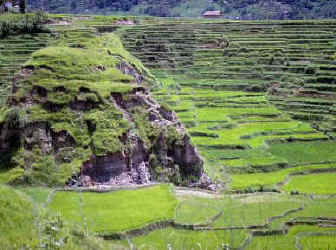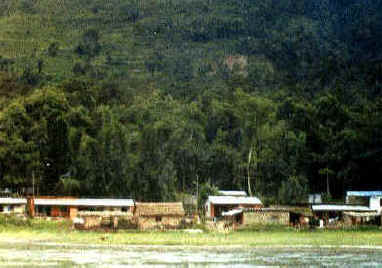|
 Landslides and erosion are serious dangers in
the steep, soft soil of the Himalayan foothills,
bamboo is the best at holding this soil
in place. Bamboo can also be grown profitably in such small and
difficult of locations as this piece of wasteland pictured below that
is surrounded by rice fields. Landslides and erosion are serious dangers in
the steep, soft soil of the Himalayan foothills,
bamboo is the best at holding this soil
in place. Bamboo can also be grown profitably in such small and
difficult of locations as this piece of wasteland pictured below that
is surrounded by rice fields.
Bamboo
performs another miracle when planted alongside
streambeds and floodplains. Its roots quickly spread out seeking
water and nutrients covering streambeds and the erosion prone stream banks
with a thick layer of roots that hold the loose rocky soil in
place. When the monsoon rains come washing the hillsides and
rice fields clean of wastes and excess fertilizers, these fertile
toxins are removed from the water by the bamboo root matting at a
nearly miraculous rate. These toxic farm wastes are cumulatively
disastrous on the river and ocean ecologies and as these same river
waters are used over and over irrigating farms on the Ganga plain
these toxins invariably accumulate in the human environment. A
problem of huge and cumulative proportions is but food and sustenance
to the beautiful bamboo.
The
first key
to achieving these huge far reaching goals is to solve the problem
of "how to encourage the local farmers and land owners to plant
and maintain bamboo?" Currently the amount of bamboo and
the market for bamboo are fairly well in balance in most areas of
Nepal. To make a significant change in the landscape a large
demand/ market needs to be created in the areas where the bamboo is
needed to be encouraged.
By teaching local villagers a variety of hand crafts using
bamboo we have significantly increased the demand and planting of
bamboo in one small area. To increase demand even further we
have been exploring various bamboo related industries. Nepal
has no ocean port and thus to compete on the international market we
must pay taxes to India in order gain access to western markets.
For this reason, and others, we are focusing on markets within Nepal
itself. Our
next plan
is to build a small (4 to 6 workers) bamboo plywood and roofing
factory near Pokhara, Nepal. This small factory will create
several hundred jobs maintaining the bamboo and weaving mats from
split bamboo, most of these jobs are traditionally done by
women. To meet the needs of this small factory many hundreds of
acres will need to be added to the surrounding environment. A
great plus for the planet as a whole.
Whenever practical divorced or widowed women -a disenfranchised
and outcaste segment of Nepal's society- are given employment and/or encouraged to learn
craft training. We are currently working with the "Women's
Environment development Association", a locally run women's help
group previously sponsored by a Danish organization, who are helping recruit local women for our
training programs. Together we are selecting those women who are not
only widowed or divorced, but who are most likely to take the training
home and share it with others in their village, thereby multiplying our
efforts exponentially. 
We
are also designing small localized projects where patches of erosion
wasted land are secured by community agreement,
lease or purchase. These parcels are then planted with Bamboo and
other grasses, fenced and then given over to a select committee of
divorced women from the area to maintain and preserve for future
industry.
Two
of the greatest destroyers of forests in Nepal are
local needs for firewood and the nearby city's demand for furniture
(really!). We are currently searching for and
designing furniture that is not only made of Bamboo but will be desirable
in the local market as well. The training schools program focuses on
furniture making, with secondary attention given to craft items salable in
local markets.
The
steep mountainsides have been virtually denuded of trees
in
many areas. The demand for firewood has long ago become impossible to
meet. The usual fallback cooking material,
ends up being manure. This practice then leads to further environmental
devastation as
the nutritious manure is not returned to the soil. Our future goals
include sponsoring bamboo firewood forests in these areas. Bamboo
out produces most other competitive crops by about 400%. This is a
sure way to enrich the community as well as the environment, as it will
not only supply firewood and charcoal from the bamboo but fodder for animals and
materials for local crafters!

The town of Bamdi where our school and nursery is located.
We are sure the road to the future is paved with bamboo, at least for
the villagers of Nepal. Won't you walk with us awhile?
Remember, the activities of the Bamboo's Secret School and Nursery
mentioned on this website are primarily supported by its founding members
with occasional donations from others. Some of the
costs of this project are paid for by the sales of our crafts and
nursery stock. We are also greatly
indebted to the support of our friends, personal and
professional, without whom all of this would not be possible.
You can
help. Really you can. We run on such a short shoestring that
you'd be surprised at how far a little can go with us. Don't be
afraid, do it now. Contact anyone at the Bamboo's Secret
Charity for more information, or to share contributions, spiffy ideas and/or work offerings
at:
The
Bamboo's Secret -- USA
Email: tech@bamboosecret.org
Phone: 1 (808) 344-8023
Or directly in Nepal:
The Bamboo's Secret School
Bamdi, Chapakot
Email to Nepal: tech@bamboosecret.org
|